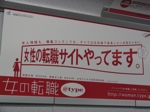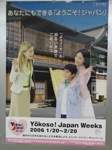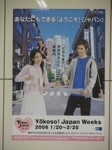I’m writing this on my way back from a short trip to Japan where I presented at a conference held at Waseda. It was a great trip, and I got good feedback both at the conference and later directly from my old advisor from my two years spent as a research student at Waseda. I’ve collected a few anecdotes and thoughts from the trip which I thought I might post here.
A Swedish Speaking Immigration Officer
At Narita airport I decided to use my Norwegian passport. My US passport is out of pages, falling to pieces (one immigration officer in Amsterdam thought it was forged and tried to pick off the already peeling plastic from the front page), and is generally not as convenient to travel with these days (shorter visa-free stays in some countries like Korea and expensive visa fees in places like Chile). As I was going through the passport control I was met with an unusually chatty inspector. The only other pleasant and friendly passport control inspector I have met was in Taiwan, where once I was asked about visiting Sayaka, learning Chinese, and whether Sayaka enjoyed living in Taiwan or not.
This time, the inspector look at my passport, smiled, and said, “Hei!” I thought he was speaking to me in English and that I was thus being greeted with an exclamation of some kind. I looked around to see what he might be trying to bring my attention to. He then said, “Can I say…Hei!” Then I realized: He is saying “Hei” in Norwegian – that is “Hello.” He said, “In Swedish I can say Hei! Can I say Hei! in Norwegian?” I said, “Yes, it is the same in Norwegian.”
My immigration officer went about continuing to process my visa and after a few seconds he looked up and said, “Norwegian and Swedish is all the same right?” I replied, “Umm…ya Danish, Swedish, Norwegian are all very close, think of it as something like Osaka dialect and Tohoku dialect.”
A few more stamps got issued and mysterious commands entered into his computer as he went back to looking like the stern mechanical immigration officer I have come to expect. Then, suddenly, he asked, “Can I say, ‘Jeg elsker deg.'” I felt a bit weird, looked around to see if there were any laughing Scandinavians nearby but smiled and said, “Yup, in Norwegian ‘I love you’ is also ‘Jeg elsker deg.”
He seemed delighted. He finished processing my entry into Japan, handed me my passport and said something like, “Takk så mykke” (sp?) I explained that while that made perfect sense in Norwegian (with a slightly different pronunciation), there were other terms for “Thank you” that we used in Norwegian if he wanted to master our particular Scandinavian dialect. He took note of my suggested alternatives on some piece of paper and continued to the next person.
An Apologetic Train Conductor
On the Keisei line train I rode from Narita airport into Tokyo, I frantically continued translating portions of my English seminar paper into the 30 minute Japanese presentation I was to deliver the next morning (I would finish at 5am and Sayaka, who was still in the US would return an emailed copy of this in corrected real Japanese only two hours later in time for my trip to the conference).
Suddenly the lights in the train went out and the train slowed smoothly to a stop. As soon as the lights went out the conductor’s voice could be heard on the intercom, “Please wait just a moment.” When the train had completely stopped the same voice explained, “I passed a signal light which I was not supposed to pass. As a result our train and an oncoming train have both automatically been forced to come to an emergency stop. The train will resume moving in just a moment. My deep apologies for the inconvenience I have caused everyone.”
Sure enough the train started moving again a moment later and passengers around me looked at each-other, some showing their disapproval that such an error could occur. I, on the other hand, was impressed at the forthright confession I had just heard, then I remembered what country I was in.
Asian Values
The conference I presented at, “The Second Annual International Conference of Prospective Researchers on Contemporary Asia” was sponsored by Waseda’s Center of Excellence – Contemporary Asian Studies and brought together some very interesting papers and presenters who were mostly young professors, post-docs, and graduate students. I was once a research assistant at the center and enjoyed seeing old friends and professors. It is difficult to spend much time active with the center without noticing its strong desire to further the creation of an “Asian community” or an “Asian identity” of one sort or another. Their motivations are of the most admirable kind: the multinational group of professors and graduate students active in COE-CAS want to overcome the deep distrust and tensions between Japan, Korea, and China, as well as welcome stronger ties with Southeast Asia and Mongolia. They are often highly critical of US arrogance, and of Western claims of universalist values. They are sensitive to the failures of previous efforts at Asian community building and especially the dark legacies of Japan’s own government support for pan-Asianism during its period of imperial expansion. Some of the supporters of an Asian identity or community at the center have highly nuanced and fluid conceptions in mind, emphasize the importance of multi-layered idenities, and some, such as in the case of my own advisor, have a deep awareness of the complex issues related to large scale world migration.
Despite this, however, I have deep reservations about the center’s mission. In debates and discussions with friends there I have on many occasion expressed my own doubts about the need for the active creation of a regional based “Asian identity” which is constructed at the hands of intellectuals or political policy based on what will inevitably be a contradictory set of perceived commonalities between participants. Also, beyond economic integration, I don’t see the need or necessarily the desirability of the creation of an institutional “Asian community” since I fear the potential for a gradually increasing exclusivity built into the concept.
Some of these concerns can be seen in the content of the conference’s final talk. At the end of the conference, Iwate University president and former Waseda professor Taniguchi Makoto gave a speech about Asian community in English. I was the only non-Asian at the talk (or at the conference for that matter) and couldn’t help noting the irony that English was the necessary choice of language given that some of the guests from Thailand and Mongolia didn’t speak Japanese (they were also the only participants not to make their presentations in Japanese). Taniguchi speaks fantastic English and his eloquent presentation fit his Cambridge education and long years of experience working for Japan’s foreign ministry, the UN, as deputy head of the OECD, and elsewhere. After an interesting analysis of Japan’s recent failures in negotiations related to the formation of “an Asian community” (indeed, he argued that after losing control of the movement, the foreign ministry is actively trying to torpedo all attempts to make anything meaningful out of the concept), he launched a critique of “Western values”. In passages that remind me of the confidence of the bubble period Japan or Asian leaders before its humbling economic crisis, Taniguchi suggested to the audience that Asia should take pride in its own values and take a more critical stance towards the West.
He offered two pieces of evidence for the inferiority of Western values. He recounted a story of when he was criticized by colleagues in France for having dined with his own chauffeur, thus violating the aristocratic separation of classes. His second anecdote lamented the inhumane behavior of New York City police officers he witnessed rudely expelling the homeless sleeping in Grand Central Station. The message was clear: Asian values have a higher degree of compassion and are less class conscious. The problem, of course, is that this is absolute nonsense. I have indeed accompanied Chinese company managers when they have dined and socialized happily with their chauffeurs in Beijing, but I have also seen Korean executives treat their chauffeurs as barely human slaves on the streets of Seoul. And as for compassion towards the homeless, it is interesting to note that one of Japan’s leading headline stories today (January 31st) is about violent clashes between Japanese police and homeless being evicted from a park in Osaka; their blue tarp tents being torn down.
If you want to look for a critique of Western “values” or enlightenment universalism, you can’t do it by attacking class inequalities or lack of compassion for the poor. Liberal reformers and socialist revolutionaries around the world, who are born in of the fires of enlightenment thought, attack these same problems. I think a sophisticated and careful look at the contradictions of enlightenment thought is needed, and Western arrogance always needs a good cutting down to size, but this clearly doesn’t work.
More than this, however, what concerned me is when the speech (and this is not the only time I have seen this) started to make heavy use of “We” versus “them” kind of language, throwing around essentialist descriptions of “The West” and assuming that there is some unproblematic “Asia” to which a whole host of generalizations can be applied to. I was trying, for example, to imagine what some of the Mongolian participants (who incidentally spoke an excellent English laced with a sharp and distinctively Russian accent that I found delightful to listen to) could claim to share in common with their Thai counterparts, and yet did not share with me? While all sorts of unexpected forms of identification can develop organically, why spend so much effort explicitly attempting to form a common identity which include these two, and yet excludes a New Zealander, a Lebanese, or a thoroughly identity confused Norwegian-American. When I asked this of someone at the evening reception, I was informed that I did not have to personally worry about being excluded myself since I was an “honorary Asian.”
While I was obviously in no position to make this point at the conference without confirming everyone’s worst stereotypes, I am equally suspicious of a discourse of “resistance against the West,” especially when it proposes the defense of some presumably superior set of particularistic values but even when it proposes a presumably unmolested coexistence. Why does universalism, for all its historical associations with imperialism and oppression, have to be countered by particularism? This particularism will inevitably contain its own internal kernels of dissent and seeds of contradiction that bear the same relation to the whole as that whole bears to universalistic claims. This is precisely the problem with multiculturalism, for instance. This is an issue that I still struggle with…
Tenshoku Boom

The “tenshoku” (changing jobs) boom, which was already very prevalent when I was in Japan continues unabated I see. I passed many train advertisements everyday advertising job related websites, many posing questions to workers about their current job or future expectations (are you learning cutting edge skills? are you valued for your ability?) which I know rarely entered into any realistic equation of consideration for my friends when they graduated from college.
I also saw a number of advertisements specifically targeting women, but in one way or another was directed to career women and not for those who might be satisfied with “office lady” jobs.
Yokoso Japan

Japan is currently running a new tourism promotion public relations campaign. Sayaka’s father, who is a professional “tourism producer” and has worked for various city and provincial governments promoting tourism through events and campaigns once explained to me the many struggles that Japan’s local governments have with trying to attract foreign tourism. He lamented the serious infrastructure, language, and cultural problems which prevent Japan’s beautiful countryside from attracting more than the most adventurous backpackers and Japanese speaking foreigners, and he has tried all manner of drives to overcome some of the issues one by one. Whether it is the language obstacles of getting foreigners comfortably housed in Japanese minshuku or ryokan inns or the fact that English on signs throughout Japan exhibit some of the most creative use of grammar and spelling of the language in the world, the problems are manifold.

On this trip to Japan I noticed that considerable advertising revenue is being spent promoting a new “Yokoso Japan” (Welcome to Japan) program. The posters are not targeting foreign visitors but the Japanese themselves – trying to get them to actively participate in “making foreigners feel welcome” in Japan. I wonder how likely it would be to find this kind of plea coming from the government in the US or in Norway. In a year when keeping unwelcome visitors out is the priority, can you imagine a sign in New York saying, “Let us work together to make foreigners feel welcome”? There is of course at least one famous example of such a sign in the city, at the Statue of Liberty no less. However, I occasionally feel that Lou Reed’s rendition of the lines is more accurate (e.g. “Bring us all your huddled masses and we’ll piss on them…”).
Prominent in many of the signs are pictures of a smiling or laughing Japanese posing next to a grateful looking blond Caucasian. While they may be out there, I have yet to see any posters with non-Caucasian foreigners, which may allow us to say something interesting on the racial level. At the bottom of each poster is request for submissions of pictures of foreigners and Japanese interacting with each other. As a blond caucasian perhaps I should submit all my photo albums from my three longer stays in Japan, in which one can find hundreds of pictures of me standing next to or interacting with some Japanese person, many of them almost complete strangers, who I owe a great deal of gratitude. Whether it is a child expanding my Japanese vocabulary and knowledge of Cicada anatomy in a Tateyama kindergarten, a Kisakata family taking my uncle and I for a hike deep into a mountain forest in Akita, or an old man who I met in a Yokohama park taking a whole day to guide me through his favorite temples in Kamakura, almost every fond memory I have of being in Japan is appropriate material. I wish all visitors and migrants who come to Japan might be as spoiled as I have been.
On that note, I was delighted to read in today’s Asahi that Osaka Prefecture has launched a program to train about a thousand “official” volunteers to help its over 200,000 non-Japanese residents with problems in their daily life and in emergency situations. The program apparently includes some training in six different languages. It apparently also includes volunteers who are themselves non-native speakers of Japanese but who can operate smoothly in Japanese society.
UPDATE: I found an online site where you can see some more of these posters here thanks to this posting by Mutant Frog.
The Classical Cafe

My friend Tony took me to a most unusual cafe yesterday. We met in Shibuya for coffee in the afternoon and the bustling district was as noisy and exhausting a place as it always is: advertisements were being blasted from every corner, smokers left their poisonous trails all along the sidewalk, and the sickening smell of thickly applied makeup emanated from every passing female. And yet, somehow in the middle of this, there is a place of serenity to be found. A little further up the hill from the station, hidden amid cheap sushi restaurants, shops selling gaudy knickknacks, and at the gate of Shibuya’s love hotel district is an old cafe serving classical music.
Inside the cafe is barely lit, as if to hide the dusty, cracked and discolored walls. The walls on three sides are covered in old portraits but against one wall is a huge speakers system, looking almost like a large church organ. Classical music is played with concert quality (when I first entered I thought there was a grand piano hidden somewhere) from the speakers into the silent darkness of the rest of the cafeteria. The cafe itself spans two floors but most of the seats are found in twos, side by side, facing the speakers, and each sharing a small table for drinks or books or papers. Besides us were perhaps half a dozen mostly elderly types, listening to music but also almost all reading or writing on a pile of papers in front of them.
A brochure reveals the day’s music repertoire, while a waiter introduces music between pieces in a voice so soft that one might think he is afraid to awake any dozing guests. When the day’s music has been played the speakers will blast some other classical music requested by a patron to the cafe. If they made the place non-smoking and added a few desk lamps for the tables, it would be a great quiet place in Shibuya to camp out and study while drinking the cafe’s unusual hot or cold “egg milk” drinks.
Definite Match
Japanese, Koreans, and Chinese I speak to often claim that they can identify their own. Indeed, the clothes people wear, the way they walk, or even the movement of their head can betray their origin and allow someone to be identified as coming from one country or other, even from a distance. Just last week, a Korean friend of mine who I showed around Yokohama for a day was able to correctly identify a group of Koreans from behind a full two floors away in Landmark plaza shopping mall. On the other hand, I know for a fact that the “hit rate” of correct identification among some of my friends for recognizing “their own” is a lot lower than many like to think. What about Europeans though? Sometimes someone looks distinctly southern European, but how much better can you get just judging by facial features (not even accounting for the growing ethnic and racial diversity of European countries today)?
Today, passing through emigration at Narita I saw a man ahead of me that I was absolutely 100% sure was a Norwegian. What does that even mean? When Japanese ask me if I can tell likely Scandinavians out of a crowd without hearing them speak, I usually say no (even though I venture the occasional, often mistaken guess), since even “stereotypical” Scandinavian-looking types can turn out to be French, Dutch, British, Russian, not to mention American, etc. Somehow though, today as I was waiting in line, I couldn’t get it out of my mind that this guy could be nothing but Norwegian. If ever there was a “representative type” of the Norwegian male, a racial stock image that could be plastered on nationalistic posters with a viking helm or fishing cap for good measure, this guy was it.
When I finally tuned in and overheard his conversation with another more “generic” blond man, sure enough, he spoke in an extremely heavy northern Norwegian dialect, marked by (to my southern ears) erratic patterns of intonation and emphasis that so many other Norwegians (myself included) often patronizingly think of as, “cute.” His fellow traveller responded in Oslo dialect. I felt a sudden and strong pang of home sickness. Then, suddenly becoming self-reflective I wondered if that feeling really told me anything at all meaningful about my attachment to the cold north? The answer, I concluded, was no, not at all. I tried to remember the last time I felt the same feeling and the result was a bit surprising. It happened last time in Bergen airport last summer. I was on my way back to the United States after spending a month in my hometown, Stavanger. Before that I had been in Seoul for two months. I was standing in line for the flight to London when ahead of me I saw half a dozen elderly Asian tourists. When I heard them speak Korean to each-other I felt exactly the same pang that I felt today in Narita airport and suddenly yearned to go back to Korea or at least be together with my Korean friends in Japan.
That tourist campaign is on the wrong track entirely. The problem isn’t a lack of English or infrastructure. I was recently on a trip to central Europe and the low English there (which was far lower than what you get in Japan) didn’t stop me and lots of other foreigners from enjoying ourselves.
There would be lots of interest in narrow-band tours. For example: Japanese rock concerts, anime, manga fairs come to mind immediately. Nostalgia tours for former JETs or armed forces personnel, car tours where you watch your car get made…the list goes on. But that’s not on offer, is it?
I like that poster though. Look at their eyes. You just know they’re not thinking about the map. It’s like the beginning of a bad porn flick. Hey, there’s another idea for a narrow-band tour…
I miss Taiwan!, no, I mean Tokyo!
>mark
You mean central Europe offer a wide variety of tours?? Tours are good for some people but I don’t like joining them.
Sayaka,
I meant English support in Japan isn’t the problem. I just used central Europe as an example of an area where I saw and heard almost no English for two weeks, and came back to Japan to see bilingual everything in all public spaces. And quadrilingual signs in the Kanto area.
I use “tour” in a loose way, not the image of 50 old people following the young girl with the flag, but as something where certain things are taken care of, like tickets to concerts, hotels, plane tickets, and where they leave you alone if you want.
Really enjoyed your discussion on the illusion of “Pan-Asian identity”. Too many people tend to look for similarities where there’s none. Every single person who wants to make generalizing statement should be forced to prove that s/he knows intimately all the regions s/he is generalizing.
Beijing Loafer – thanks for that comment. As you can tell, I’m all for caution in this regard. However, I wouldn’t stop at having familiarity with the region to make generalizations. Often those of us who have spent a lot of time in the region become blind to the similarities (virtues or problems alike) between those areas that we comment on and our own places. I found this to be true on my return to Norway two years ago (the first time in 5 years)…I found myself looking at the place with completely new eyes…
Hi there, I found your site via Altavista while searching for thoughts on this subject and your article looks very interesting for me.